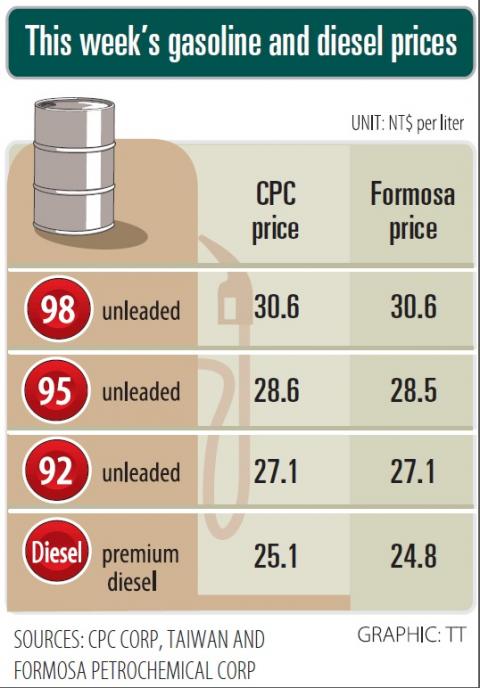CPC Corp, Taiwan (CPC, 台灣中油) is to appoint company vice president Lee Shun-chin (李順欽) as its new president, replacing Liu Cheng-hsie (劉晟熙), who has resigned due to health reasons, local media reported on Saturday, citing Ministry of Economic Affairs sources.
CPC, along with three other state-run companies — Taiwan Power Co (台電), Taiwan Sugar Corp (台糖) and Taiwan Water Corp (台水), is under the supervision of the ministry’s State-Owned Enterprise Commission.
The appointment is pending the approval of the Executive Yuan and the ratification of the refiner’s board in a meeting scheduled to be held later this month, media reported.

Lee, 65, has worked at CPC for 38 years and is also chief executive officer of the company’s refinery business division.
He is to take office next month at the earliest and must deal with a controversial liquefied natural gas (LNG) terminal project off the coast of Datan Borough (大潭) in Taoyuan’s Guanyin District (觀音) amid opposition from environmentalists, reports said.
CPC plans to start the construction of the LNG terminal in June and the ministry has proposed to reduce the planned area of the terminal to protect coastal algal reefs, but the project has yet to pass an environmental impact assessment by the Environmental Protection Administration.
Separately, CPC yesterday announced that it will hike fuel prices this week for the fifth week in a row, as crude oil prices moved higher last week amid growing market confidence that OPEC will maintain its efforts to implement an output cut and due to a continued decline in the US crude oil inventories.
CPC said that its average cost of crude oil increased by US$1.34 per barrel to US$67.06.
This meant it had to increase gasoline prices by NT$0.2 per liter and diesel prices by NT$0.3 per liter from today after factoring in the New Taiwan dollar’s appreciation of NT$0.012 against the US dollar, the refiner said.

CAUTIOUS RECOVERY: While the manufacturing sector returned to growth amid the US-China trade truce, firms remain wary as uncertainty clouds the outlook, the CIER said The local manufacturing sector returned to expansion last month, as the official purchasing managers’ index (PMI) rose 2.1 points to 51.0, driven by a temporary easing in US-China trade tensions, the Chung-Hua Institution for Economic Research (CIER, 中華經濟研究院) said yesterday. The PMI gauges the health of the manufacturing industry, with readings above 50 indicating expansion and those below 50 signaling contraction. “Firms are not as pessimistic as they were in April, but they remain far from optimistic,” CIER president Lien Hsien-ming (連賢明) said at a news conference. The full impact of US tariff decisions is unlikely to become clear until later this month

GROWING CONCERN: Some senior Trump administration officials opposed the UAE expansion over fears that another TSMC project could jeopardize its US investment Taiwan Semiconductor Manufacturing Co (TSMC, 台積電) is evaluating building an advanced production facility in the United Arab Emirates (UAE) and has discussed the possibility with officials in US President Donald Trump’s administration, people familiar with the matter said, in a potentially major bet on the Middle East that would only come to fruition with Washington’s approval. The company has had multiple meetings in the past few months with US Special Envoy to the Middle East Steve Witkoff and officials from MGX, an influential investment vehicle overseen by the UAE president’s brother, the people said. The conversations are a continuation of talks that

CHIP DUTIES: TSMC said it voiced its concerns to Washington about tariffs, telling the US commerce department that it wants ‘fair treatment’ to protect its competitiveness Taiwan Semiconductor Manufacturing Co (TSMC, 台積電) yesterday reiterated robust business prospects for this year as strong artificial intelligence (AI) chip demand from Nvidia Corp and other customers would absorb the impacts of US tariffs. “The impact of tariffs would be indirect, as the custom tax is the importers’ responsibility, not the exporters,” TSMC chairman and chief executive officer C.C. Wei (魏哲家) said at the chipmaker’s annual shareholders’ meeting in Hsinchu City. TSMC’s business could be affected if people become reluctant to buy electronics due to inflated prices, Wei said. In addition, the chipmaker has voiced its concern to the US Department of Commerce

STILL LOADED: Last year’s richest person, Quanta Computer Inc chairman Barry Lam, dropped to second place despite an 8 percent increase in his wealth to US$12.6 billion Staff writer, with CNA Daniel Tsai (蔡明忠) and Richard Tsai (蔡明興), the brothers who run Fubon Group (富邦集團), topped the Forbes list of Taiwan’s 50 richest people this year, released on Wednesday in New York. The magazine said that a stronger New Taiwan dollar pushed the combined wealth of Taiwan’s 50 richest people up 13 percent, from US$174 billion to US$197 billion, with 36 of the people on the list seeing their wealth increase. That came as Taiwan’s economy grew 4.6 percent last year, its fastest pace in three years, driven by the strong performance of the semiconductor industry, the magazine said. The Tsai